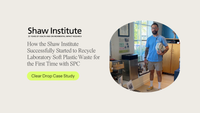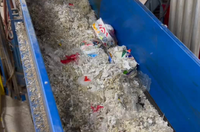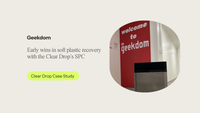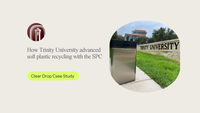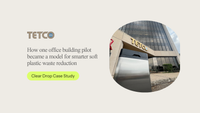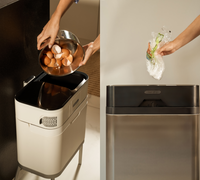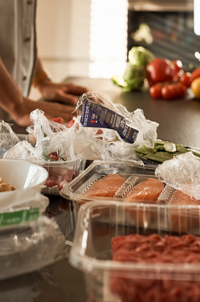Commercial buildings generate a large share of soft plastic waste — from deliveries, shipments, food packaging, and office supplies — most of which ends up in landfills. This case study shows how one multi-tenant office building piloted the Soft Plastic Compactor (SPC) and proved that even a small shift in workplace waste handling can significantly reduce volume, improve recycling rates, and elevate ESG performance.
In the heart of a major U.S. city, San Antonio, a 10-story commercial office building with up to 30 tenant companies took a step toward smarter sustainability. The building’s management sought an effective, hands-on solution to deal with soft plastic waste generated by significant traffic, regular deliveries, and daily office activity.
Until recently, the entire building's soft plastic went straight into general waste bins and, inevitably, landfills.
Recognizing this recycling gap, the management team agreed to test a new sustainable approach by piloting the Soft Plastic Compactor (SPC), a first-of-its-kind device designed specifically to deal with flexible plastics at the point of disposal.
The goal: reducing waste and changing behavior
Unlike other recycling efforts, soft plastics — such as mailers, wrappers, and packaging — are often overlooked. They’re lightweight, shapeless, and notoriously hard to recycle. Most commercial buildings lack the infrastructure to separate or reallocate these materials.
This pilot focused not only on waste reduction but also on behavioral change — testing how a shared, high-traffic environment would respond to a new sustainability intervention. The experience also helped identify how to better communicate and position the Soft Plastic Compactor (SPC) within a commercial setting.
“It’s great to finally see a solution targeting the soft plastic waste we all know ends up in the trash. It's sparked some good conversations among tenants already.”
— Tenant feedback, Week 1

The plan: installing an SPC
The SPC was installed in a central public area frequented by employees and service staff. Clear signage explained what the device was, what types of plastics it accepts, and why it mattered. There were no lengthy training sessions — the UX was intuitive enough for immediate adoption.


Initial reactions and feedback
Within days, the building began to see early signs of success. Staff and tenants engaged with the machine organically and showed increased curiosity about soft plastic waste, sustainability, and recycling behavior.
Some initial user feedback helped identify opportunities for improvement — such as screen readability and UX ergonomics — which will inform updates for future pilots.
“We didn’t know what to expect, but people started asking about the machine almost immediately. It feels like something new is possible here.”
— Building staff comment
SPC’s immediate impact
The SPC became a learning lab for the building’s management and Clear Drop. The team tracked how tenants used the machine, what signage worked best, and what kinds of plastics were being collected.
From day one, tenants fed a variety of flexible plastics into the SPC, including:
- Food wrappers and grocery bags
- Shipping mailers and packaging film
- Bubble wrap and soft protective materials
With the SPC positioned in a central high-traffic area, the team also evaluated responsibility and workflow — such as who should empty the device and how often, and what internal infrastructure a multi-tenant building needs for successful adoption.
Results: SPC minimized plastic waste and spotlighted sustainability innovation
The pilot demonstrated that even modest behavioral shifts can drive meaningful sustainability gains in shared office environments. The SPC reduced soft plastic waste volume, improved recyclability, and sparked visible tenant engagement.
Management now views the SPC as a valuable sustainability amenity — a practical way to demonstrate commitment to environmental responsibility, innovation, and accountability.
The building’s team is evaluating future SPC expansions as part of broader ESG initiatives and corporate sustainability improvements.
Why SPC Works for Offices and Multi-Tenant Buildings
- Decentralized soft plastic disposal at the point of waste generation
- Clear signage and simple UX encourage employee engagement
- Reduces plastic waste volume by up to 90%
- Enables real recycling through Clear Drop partner network
- Strengthens visible sustainability commitments to tenants and clients
Make Your Office Sustainability Visible and Actionable
The Clear Drop® Soft Plastic Compactor (SPC) transforms flexible plastic waste into compact 12×8×4-inch blocks — easy to store, ship, and recycle through our partners.
Learn more about SPC for business:
https://onecleardrop.com/pages/for-business
Frequently Asked Questions
How does the SPC improve recycling for commercial buildings?
It prepares flexible plastics for real recycling by compacting them into dense, shape-preserving blocks that can be collected and processed by Clear Drop partners.
How often does the SPC need to be emptied?
Typically once per month in an office environment, depending on the volume of plastic collected.
What types of plastics can the SPC handle?
Most flexible plastics including shipping mailers, garment bags, bubble wrap, and soft packaging film. PVC and polystyrene are not accepted.
What sustainability benefits does the SPC provide businesses?
The SPC reduces waste volume by up to 90%, decreases landfill contribution, improves ESG alignment, and boosts tenant or employee engagement in sustainability.






